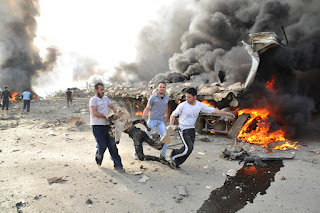Every year, Syria’s crisis demands more of the world’s aid than the last.
Every year, this crisis demands more of Syrians than the last.
“Every day is worse than yesterday,” Abu Mohammed tells me as we sit in a damp room in a basement that’s been home for him and his wife and seven children for the past two-and-a-half years.
“I wish it was last month because it was better then.”
A deep crack runs across dingy yellow walls, the thin mattresses covering a concrete floor are torn.
Even cheap plastic bowls are cracked and held together by stitches.
Abu Mohammad’s semblance of a life has also been steadily falling apart. He’s fled this war three times.
‘Humanitarian test’
There are thousands of other displaced families. Kisweh’s population has more than quadrupled in recent years.
And since August, there’s been some quiet here because of a local ceasefire in what is a deeply-contested area.
We move across Kisweh, through neighbourhoods controlled by the government and in and out of opposition areas, with a Unicef team.
The UN’s Agency for Children takes the lead on water and education in the UN’s response to what it has long described as “the humanitarian test of our time”.
Like other UN agencies, it’s asking for a record sum of money in this year’s Humanitarian Response Plan (HRP) being announced in Geneva.
“The needs are becoming bigger and bigger and it’s very difficult to visualise it for the rest of the world,” remarks Razan Rashidi, Unicef’s communication officer in Syria who’s travelling with us.
“It’s even difficult for Syrians to understand the scale of destruction.”
Look at the drawn faces, as grey as the concrete buildings all around them, and you start to understand.
Water as a weapon
Some of their more than 20 grandchildren, all with round drooping eyes, silently stare as their street fills with the rumble of a tanker delivering water provided by the UN through a local contractor.
“You can’t imagine how much people suffer without water,” reflects Atef Dieb, Unicef’s water and sanitation officer.
“Sadly, water has been used as a weapon of war in this conflict.”
For More: http://www.bbc.com/news/world-middle-east-35024918

No comments:
Post a Comment